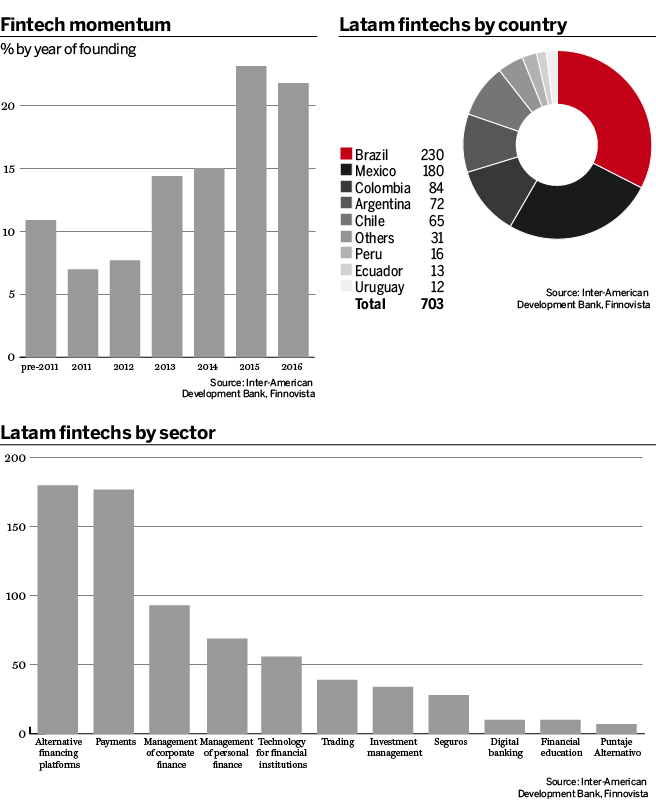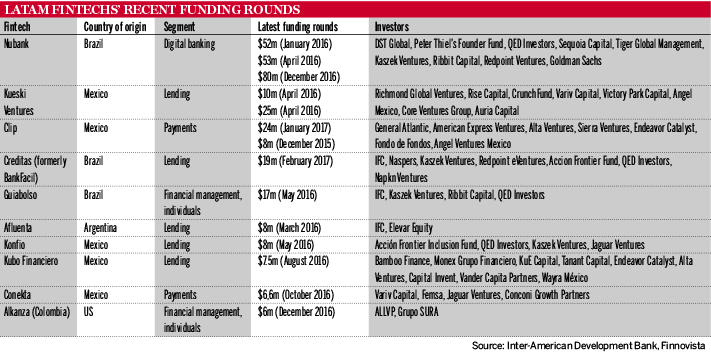Latin America’s fintech firms are grabbing the attention of policy-makers, multilateral organisations and investors, spurring banks to devise new strategies to compete with the newcomers shaking up an otherwise conservative market.
Regulators from Argentina to Mexico are also drafting fintech laws. Organisations such as the Inter-American Development Bank (IDB) and the World Bank’s International Finance Corporation are providing technical and financial support on the back of the ability of fintech companies to increase financial inclusion.
Fintech was the largest sector among all Latam start-ups in 2016 with 38 deals, an 81% increase from 2015, according to the Latin America Venture Capital Association. It attracted more than $188m in capital – an annual increase of 31% and more than one-third of the total directed at start-ups in the region. Dedicated fintech accelerators are being created, particularly in Mexico, such as Fintech Mexico and the local venture of UK-based Startupbootcamp, its first in Latin America.
The IDB is funding a 10-month programme, Finconecta, in association with Florida-based fintech company Above & Beyond, where financial institutions can search for a provider that has the skills matching a problem they need solving. This matchmaking activity serves as an accelerator for the start-up. Of the 703 fintech companies in Latin America, more than 60% were created between 2014 and 2016, according to data from accelerator Finnovista and the IDB.
Banks taking note
Momentum is building behind the fintechs and banks are beginning to understand that they cannot afford to ignore it. Many are studying ways to embrace both new technology and newcomers to keep on top of an evolving banking sector.
Conversely, fintechs see the benefits of working with rather than against banks, according to Fernando Moreno, BBVA’s San Francisco-based head of business development in the US, and a former head of market development in Latin America at PayPal. “Only a few years ago, fintechs were delivering a message of disruption, attacking key value propositions within banks. Now it’s more about collaboration and partnering,” he says. BBVA made a major fintech acquisition in Latin America in December in the shape of Mexican payments start-up OpenPay.
Brazil continues to lead in terms of the number of fintechs in Latin America, at 230, followed by Mexico with 180, according to Finnovista. Brazil, which has typically been at the forefront of financial innovation in the region, is set to look at rules to deal with newcomers in the credit space and facilitate the entry of foreign banks in the local market by eliminating the need for a presidential decree to continue the approval process.
However, Mexico appears to be out in front when it comes to regulation, with a proposed law that some consider the most comprehensive attempt to regulate new financial solutions in Latin America. Mexico is also closing the gap with Brazil in terms of overall funding of start-ups across all sectors, not just fintech, according to the Latin American Venture Capital Association, and has surpassed its southern neighbour in the number of investment deals.
Mexico aims high
Fintech Mexico CEO Jorge Ortiz says the country is keen to grab the unclaimed title of regional hub for financial start-ups. “[The Mexican government] considers the fintech industry as one of the top industries to develop in the country. We are in discussions with it,” he says. “The fintech ecosystem in Mexico is [only now] developing but is definitely coming together: you can find US venture capital funds, banks are starting to open up and talk to entrepreneurs... and law firms are doing fintech advisory work pro bono. We want to become the fintech capital of Latin America.”
Fintech Mexico is also talking to the government about the fintech law, adds Mr Ortiz. This is expected to be debated in Congress in September and will regulate activities such as crowdfunding, electronic payments and virtual asset managers. It will also consider the creation of a regulatory sandbox to allow start-ups to operate under minimum rules, based on the experience of the UK.
Other regulators are looking at specific legislation of new products, for example, in Argentina and Colombia on crowdfunding. Knowledge and best practice sharing between regulators is becoming increasingly important as the question of how to respond to innovation in financial services is still up for debate across Latin America.
“One philosophy says let [fintech] grow, and once it’s grown we regulate it; the other philosophy says this thing is coming, let’s build regulation around it and then we let it grow,” says Mr Moreno. “Compared to places such as the UK or Singapore, [Latin American fintech] regulation is probably lagging, but we do see many of the regulators interested in this space, talking to each other and reaching out to other markets to understand what they’ve done.”
Regional expansion
In many aspects, Latin America is an ideal destination for fintech. The region’s 620 million people mostly speak one of two languages – Spanish and Portuguese – compared with the many spoken in the growth markets of south-east Asia. It is predicted that half of the population will be using mobile phones to access the internet by 2020, according to GSMA, the international association of mobile service providers.
Local skills are also a draw. BBVA’s Mr Moreno is impressed by the growing number of talented young people now interested in fintech in Latin America. “I begin to see a bit of levelling of the playing field in terms of good talent coming out of the region. When you look at [where] that talent went only few years ago, it was limited to a particular industry or a small group of companies. Now it’s more spread and is interested in taking a chance on fintech,” he says.
Banks realise that they also need to compete on the hiring front with fintechs that offer attractive prospects to these bright candidates with newly desirable skills.
This is clear to Bradesco’s chief information officer, Mauricio Minas, who is looking at digital services from the perspective of both the end-user and the team that creates them. For example, to create Bradesco’s recently launched app, Next, Mr Minas added new professions to the bank such as anthropologists, psychologists and data scientists, to map 150 ‘life moments’ that are associated in some way to financial activity – from ordering a taxi to buying a car. “Financial services don’t have the sex appeal of whatever is happening on social media’s digital platforms. [We asked ourselves] if we were to build a bank now, how would we do it?” he says.
Like other established players in the region, Bradesco also works in partnership with fintechs through its own innovation lab, Inovabra. Launched in 2014, it was the first accelerator by a big Brazilian bank, according to Finnovista.
Mutual benefits
Laura Gaviria Halaby, global head of fintech acceleration at Citi, say co-operation is key – especially for local banks that may be less accustomed to working with potential competitors than their international peers. “Local banks may see fintechs more as a threat but it’s [only] a threat if they don’t embrace these new companies as a way to grow their own market share. It wouldn’t be a threat if they figured out a model to collaborate and leverage on each other’s strengths,” she adds.
Banks can also provide the necessary capital to support the growth of these start-ups, with whom they can then collaborate with. BBVA Bancomer, BBVA’s Mexican business, discovered OpenPay, the payment firm it acquired in 2016, through its Open Talent competition, which the fintech company won in 2015. And Grupo Sura, owner of Bancolombia, accompanied Latam specialist fund Allvp in a $6m investment in the Colombian operations of US automated financial adviser Alkanza in December.
In addition to the growth of local venture funds such as Allvp, Latin America can boast the experience developed by early accelerators such as NXTP Labs, which expanded from Argentina to Chile, Colombia, Mexico and Uruguay and has co-invested with more than 150 angel investors since its creation five years ago. Additionally, more advanced fintechs now appear to be finding it easier to raise large sums; for example, São Paulo-based Nubank’s sizeable $80m capital injection by a group of international investors in 2016. Yet the region has a long way to go to catch up with the angel investing culture in the US.
“The culture and the capital of angel investing is not as present in [Latin America] when you compare it to places such as [the US],” says Mr Moreno. Attracting the attention of established US funds is hard, he adds, saying: “The US is such a big market that a lot of the focus stays [there]. When [US funds] start thinking about international expansion, the playbook typically takes them to the UK because consumer behaviour and demand is similar, and then they go towards Asia [where there is big growth].”
This makes fostering greater co-operation between Latin American banks and local start-ups all the more important. Ms Gaviria Halaby is optimistic. She notes that banks are joining informal communication channels where ideas and achievements are shared with fintechs, established technology firms and multilateral organisations.
“I think that, as an ecosystem, we all understand that everybody benefits from openness and collaboration and creating those types of spaces [which can be as simple as a WhatsApp group] to have those conversations,” she says. “More and more programmes are being created in the region. Organisations such as the IDB and other multilaterals are now getting into the fintech space. All of that is going to help create that ecosystem that will help fintechs [and banks] thrive.”
As the financial services sector becomes increasingly competitive in Latin America, it appears banks, newcomers and policy-makers are keen to work more closely together rather than against each other.















